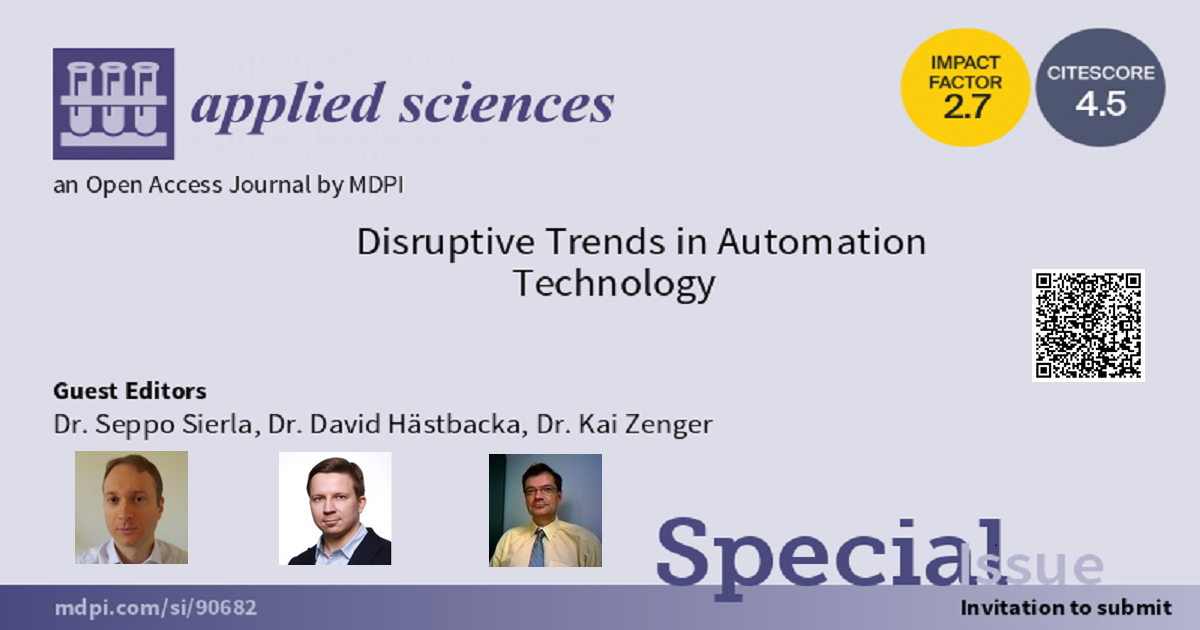- 2.5Impact Factor
- 5.5CiteScore
- 17 daysTime to First Decision
Disruptive Trends in Automation Technology
This special issue belongs to the section “Robotics and Automation“.
Special Issue Information
Dear Colleagues,
The industrial sector is being transformed by the convergence of information technology and operational technology. The latter is another name for automation technology and covers established systems such as supervisory control and data acquisition (SCADA), programmable logic controllers (PLC), fieldbuses and automation and control systems. As this technology is connected to the Internet and 5G networks, some monitoring, control and analytic functionalities are deployed to the edge or cloud, and researchers are challenged to ensure the security, dependability, real-time performance and maintainability of the resulting systems. The big data that is accessible from these systems create opportunities for artificial intelligence applications that can further disrupt the established practices in the automation domain. For example, reinforcement learning is emerging as an alternative technology for industrial process control and optimization, and machine learning is heavily applied to fault diagnostic and predictive maintenance. Real-time connectivity, cloudification, big data and artificial intelligence are all driving the transformation of conventional simulators to digital twins.
In this Special Issue, we welcome contributions on advances in automation technology, especially but not limited to the abovementioned disruptive developments. Survey papers and reviews are also welcomed.
Dr. Seppo Sierla
Dr. David Hästbacka
Dr. Kai Zenger
Guest Editors
Manuscript Submission Information
Manuscripts should be submitted online at www.mdpi.com by registering and logging in to this website. Once you are registered, click here to go to the submission form. Manuscripts can be submitted until the deadline. All papers will be peer-reviewed. Accepted papers will be published continuously in the journal (as soon as accepted) and will be listed together on the special issue website. Research articles, review articles as well as short communications are invited. For planned papers, a title and short abstract (about 100 words) can be sent to the Editorial Office for announcement on this website.
Submitted manuscripts should not have been published previously, nor be under consideration for publication elsewhere (except conference proceedings papers). All manuscripts are thoroughly refereed through a single-blind peer-review process. A guide for authors and other relevant information for submission of manuscripts is available on the Instructions for Authors page. Applied Sciences is an international peer-reviewed open access semimonthly journal published by MDPI.
Please visit the Instructions for Authors page before submitting a manuscript. The Article Processing Charge (APC) for publication in this open access journal is 2300 CHF (Swiss Francs). For papers submitted to this special issue through the collaboration with the Automation Days 2023 conference (https://www.automaatioseura.fi/automationdays2023/), the APC is 1955 CHF. Submitted papers should be well formatted and use good English. Authors may use MDPI's English editing service prior to publication or during author revisions.
Keywords
- automation
- control technology
- simulation
- digital twin
- cloud
- edge
- big data
- artificial intelligence
- machine learning
- reinforcement learning

Benefits of Publishing in a Special Issue
- Ease of navigation: Grouping papers by topic helps scholars navigate broad scope journals more efficiently.
- Greater discoverability: Special Issues support the reach and impact of scientific research. Articles in Special Issues are more discoverable and cited more frequently.
- Expansion of research network: Special Issues facilitate connections among authors, fostering scientific collaborations.
- External promotion: Articles in Special Issues are often promoted through the journal's social media, increasing their visibility.
- Reprint: MDPI Books provides the opportunity to republish successful Special Issues in book format, both online and in print.


